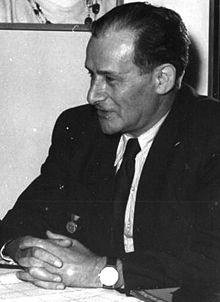fiction.wikisort.org - Writer
Friedrich Wolf (23 December 1888 – 5 October 1953) was a German doctor and politically engaged writer. From 1949 to 1951, he served as East Germany's first ambassador to Poland.[1]
This article includes a list of general references, but it lacks sufficient corresponding inline citations. (January 2013) |
Friedrich Wolf | |
|---|---|
 Friedrich Wolf (1952) | |
| Born | 23 December 1888 Neuwied, Rhine Province, Germany |
| Died | 5 October 1953 Lehnitz (Berlin), Brandenburg, Germany |
| Occupation | Physician writer politician Diplomat |
| Political party | KPD (1926) SED (1950) |
| Spouse(s) | Kaethe Gumpold (1914) Else (Eva) Dreibholz (1922) |
| Children | Johanna Marie (1915) Lukas (1919) Markus (1923–2006) Konrad (1925–1982) by Lotte Rayss Lena by Irmgard Schaaf Thomas Naumann (1953) |
| Parent | Max & Ida Wolf |
Life
Wolf was born in Neuwied (Rhine Province), the son of a Jewish merchant.
From 1907 until 1912, he studied medicine, philosophy and art history in Munich, Tübingen, Bonn, and Berlin and became a doctor in 1913. In 1914 he worked first as a ship's doctor on the route between Canada, Greenland and the United States, and then in the same year became a field doctor on the Western Front in World War I; this experience made him a strong opponent of war. In 1917 he published his first prose pieces.

In 1918 he became a member of the Workers council in Dresden and joined the Independent Social Democratic Party of Germany. After the war he worked as a doctor in Remscheid and Hechingen, where he focused on care for common people and prescribed treatment using naturopathic medicine. In 1923 and 1925 his sons Markus and Konrad were born. After 1928 he became a member of the Communist Party and the Association of Proletarian-Revolutionary Authors. In 1929 his drama "Cyankali" sparked a debate about abortion, and he was briefly arrested and charged for performing abortions.
In early 1932, he founded the Spieltrupp Südwest in Stuttgart, a communist agitprop group of lay actors that created controversial pieces about current topics.
After the Nazis came to power, Wolf emigrated with his family to Moscow. In 1938 he made his way to Spain to work as a doctor in the International Brigades. However, he was arrested in France and interned in the concentration camp Le Vernet. In 1941 he gained Soviet citizenship and returned to Moscow where he became a founder of the National Committee for a Free Germany (NKFD).
In 1945 he returned to Germany and was active in literary and cultural-political issues. From 1949 to 1951, he was the first ambassador of East Germany to Poland. On 5 October 1953 he died in his personal office in Lehnitz. The Land Forces of the National People's Army named the 1st Motor Rifle Division's 1st Panzer Regiment in his honor.
Works
- Mohammed (1917, drama)
- "Langemarck" (1917, story)
- Das bist du (1919, drama)
- Der Unbedingte (1919, drama)
- Die Schwarze Sonne (1921, drama)
- Tamar (1922, drama)
- Die Schrankkomödie (1923, drama)
- Der Arme Konrad (1923, drama)
- Das Heldenepos des alten Bundes (1924)
- Kreatur (1925, novel)
- Kolonne Hund (1926, drama)
- Äther (1926)
- Die Natur als Arzt und Helfer (1927)
- Koritke (1927, drama)
- "Der Kampf im Kohlenpott" (1927, novella)
- Cyankali (1929, drama)
- Die Matrosen von Cattaro (1930, drama)
- Tai Yang erwacht (1930, drama)
- Professor Mamlock (1933, drama)
- Floridsdorf (1934, drama)
- Das trojanische Pferd (1935, drama)
- Chin Up, Anna! (1935, short story)
- Zwei an der Grenze (1938, novel)
- Beaumarchais (1940, drama)
- "Der Russenpelz" (1942, novella)
- Heimkehr der Söhne (1944, novel)
- Dr. Lilli Wanner (1944, drama)
- Was der Mensch säet (1945, drama)
- Die letzte Probe (1946, drama)
- Märchen für große und kleine Kinder (1946)
- Wie Tiere des Waldes (1947, drama)
- The Council of the Gods (Der Rat der Götter) (1949, filmscript)
- Bürgermeister Anna (1949, comedy)
- Menetekel (1952, novel)
- Thomas Müntzer (1952, drama, film expose)
Awards and decorations
- Order of the Red Star (1943)
- National Prize of East Germany
- 2nd class for Professor Mamlock (1949)
- 1st Class for The Council of the Gods (1950)
Literature
- Hoffmann, Stefan Gotthelf: Der Rest ist Schweigen! Erdachte Gespräche mit Friedrich Wolf (1888–1953). Edition Schwarzdruck, Gransee 2013, ISBN 978-3-935194-63-1.
- Müller, Henning: Friedrich Wolf : 1888–1953. Deutscher Jude, Schriftsteller, Sozialist. (Jüdische Miniaturen; Bd. 78) Hentrich & Hentrich, Berlin 2009, ISBN 978-3-938485-90-3.
- Müller, Reinhard: Was ist ein Mensch? Aus der Moskauer Kaderakte Friedrich Wolfs. In: Einspruch. Schriftenreihe der Friedrich-Wolf-Gesellschaft. Exil in der Sowjetunion. Herausgegeben von Hermann Haarmann und Christoph Hesse. Marburg 2010, p. 23–52.
References
- Bernd-Rainer Barth. "Wolf, Friedrich * 23.12.1888, † 5.10.1953 Schriftsteller". Bundesstiftung zur Aufarbeitung der SED-Diktatur: Biographische Datenbanken. Retrieved January 4, 2015.
На других языках
- [en] Friedrich Wolf (writer)
[ru] Вольф, Фридрих
Фри́дрих Вольф (нем. Friedrich Wolf; 23 декабря 1888[2][3][4][…], Нойвид — 5 октября 1953[2][3][5], Лениц, Бранденбург) — немецкий писатель, драматург, общественный и политический деятель. Коммунист. Отец начальника Главного управления разведки МГБ ГДР Маркуса Вольфа и кинорежиссёра Конрада Вольфа.Другой контент может иметь иную лицензию. Перед использованием материалов сайта WikiSort.org внимательно изучите правила лицензирования конкретных элементов наполнения сайта.
WikiSort.org - проект по пересортировке и дополнению контента Википедии